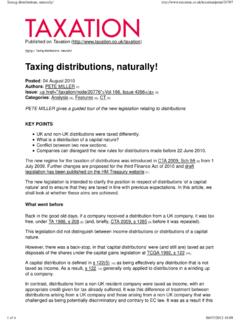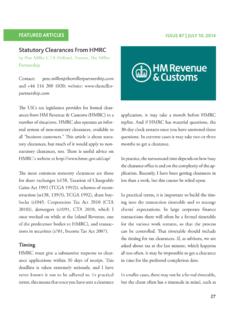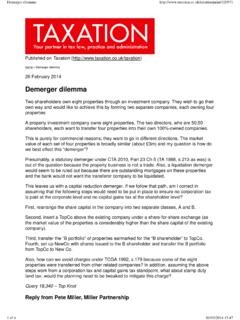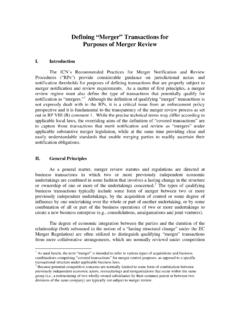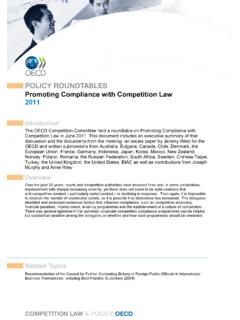Transcription of Summer Finance Bill - themillerpartnership.com
1 ~ 31 July 2015 Amortisation of corporate goodwill Pete Miller Partner, The Miller Partnership Email: Tel: 0116 208 1020 e abolition of the tax deduction for the amortisation or impairment of purchased goodwill by companies is a major makeover of the corporation tax landscape. Back in FA 2002, the government bought in two major changes to the corporate tax system. e rst was the substantial shareholdings exemption, which meant that trading companies or groups selling trading subsidiaries or sub-groups would usually not pay corporation tax on any gains arising. At the same time, the corporation tax regime for intangible xed assets was introduced.
2 For most people, the main e ect of the intangibles regime was that, if a company were to buy a business, the amortisation or impairment of the goodwill would be deductible for corporation tax purposes. Both regimes were welcome additions to the corporate tax system and both were designed to make the UK a more competitive environment for , this led to the bizarre situation that, from 1 April 2002, a vendor would invariably want to sell the shares in a company, either to take advantage of the substantial shareholdings exemption or to be able to claim a lower rate of capital gains tax available to individuals (business asset taper relief or entrepreneurs relief).
3 Purchasers, though, were likely to prefer an asset transaction so that they could claim corporation tax deductions for the amortisation or impairment of goodwill. is con ict was pointed out to the Inland Revenue at the time. What exactly has been done? Following the removal of the corporation tax deduction for goodwill on the incorporation of a business, from 3 December 2014, the chancellor announced that, as of 8 July 2015, companies would not be allowed a deduction for goodwill acquired on or a!er that date. is does not just apply to related party transactions; it applies to all goodwill acquisitions by companies.
4 E main change is the introduction of a new s 816A in CTA 2009, by cl 32 of the Summer Finance Bill, published on 15 July. Section 816A(3) says that no debits can be brought into account for the amortisation or impairment of relevant a result, the legislation introduced by FA 2015 s 26, CTA 2009 ss 849B 849D, is repealed with e ect from 8 July 2015 (cl 32(7), (8)) making it one of the more short lived pieces of UK legislation. is only applies to goodwill, though, does it not? Not quite. e restriction applies to relevant assets (CTA 2009 s 816A(2)), which are: !goodwill; !information relating to customers or potential customers of a business; !
5 Customer relationships of a business; !unregistered trademarks or other signs used in the business; and !licences or other rights in respect of any of the above categories of asset. Most of these categories are assets which we would normally treat as goodwill (for example, the case of Nicholson [1931] 2 Ch 1 tells us that unregistered trademarks are a part of the goodwill of a trade), and this list of relevant assets is identical to that given for the goodwill amortisation restrictions introduced on 3 December 2014. I was going to complete my transaction on 9 July. is seems unfair. Why am I caught?
6 You may not be caught. e new legislation applies to acquisitions on or a!er 8 July 2015 (cl 32(9)). However, it may be that the purchase contract had already become unconditional before that date. If a completion on or a!er 8 July 2015 was in pursuance of an obligation that had become unconditional before that date, then your acquisition will still be under the old rules and you will be able to claim corporation tax deductions for the amortisation or impairment of goodwill (cl 32(10)). My company bought a business some time ago. Is it a!ected? No, your company should not be a ected. is measure only applies to new acquisitions of goodwill on or a!
7 Er 8 July 2015. If your company acquired goodwill in a business purchase prior to that date, then you are entitled to continue claiming a tax deduction for any amortisation or impairment of that goodwill. What happens if the company sells the business? If the company sells the business, there will either be a credit or debit on realising the goodwill. Credits will be treated for tax purposes in the normal way under CTA 2009 Part 8. For example, on disposal of a trade, any credit on realisation of the goodwill will be treated as a trading receipt (CTA 2009 s 747). If the goodwill does not relate to a trade, UK property business or other type of de ned undertaking, then it is chargeable to corporation tax as a non-trading receipt (CTA 2009 s 752).
8 Part of the new rule is that any debit arising on a realisation of acquired goodwill is to be treated as a non-trading debit (CTA 2009 s 816A(4)). is makes it relatively less exible in terms of its use. Non-trading debits can only be set against other pro ts of the company for the same accounting period (CTA 2009 s 753(1)); group relieved, although they rank last in the list of losses and other amounts available for group relief under CTA 2010 s 99(1); or carried forward to be treated as a non-trading debit of future accounting periods of the company (CTA 2009 s 753(3)). Can I claim tax deductions for the amortisation of other intangible assets?
9 Yes, indeed. is measure only applies to the relevant assets, as listed above. If you buy other intangible property, such as patents or knowhow or the right to use a brand, the amortisation of those costs will be allowed in the normal way, following the accounting treatment determined by FRS 102 or IAS. Why is the change being made? To be frank, it is hard to tell. One of the e ects of the intangibles regime was that, when a sole business or partnership was incorporated, any goodwill arising on the company s balance sheet would generate corporation tax deductions on the amortisation or impairment, even though the business was in the same economic ownership.
10 Once again, this was commented upon when the legislation was introduced, but it remained a feature of the corporation tax system until December 2014. When it was repealed, the reasons given were that this was unfair, as people who chose to start their business within a company would never be able to recognise the internally generated goodwill for accounting purposes, and neither would people who chose not to incorporate. Furthermore, this measure was listed in the Autumn Statement document under the heading of Avoidance and evasion ! So no believable reason was given for that change. We cannot really believe that the government or HMRC considered the amortisation of goodwill on incorporation as being tax avoidance, since it took over 12 years to change it.
